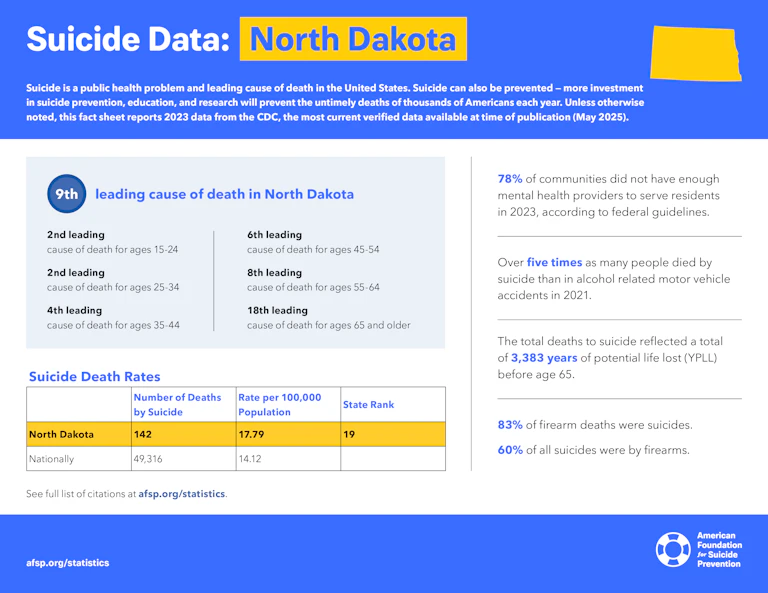North Dakota

North Dakota suicide prevention plans and initiatives
The North Dakota Suicide Prevention Program, previously led by the Department of Health (NDDoH) Division of Injury & Violence Prevention, is now housed within the Department of Human Services (DHS) Behavioral Health Division. In 2017, prior to the move, NDDoH released the North Dakota Suicide Prevention Plan 2017-2020 to focus and coordinate statewide suicide prevention efforts; AFSP-North Dakota participated in development of the plan.
In April 2018, the DHS Behavioral Health Division released the North Dakota Behavioral Health System Study, an evaluation of the state’s behavioral health system written by the Human Services Research Institute (HSRI), which identified a shortage of prevention and early intervention services. The Division then launched the North Dakota Behavioral Health Vision 20/20 project, led by the Behavioral Health Planning Council and endorsed by DHS and the Governor’s office. Based on major recommendations from the HSRI report, the Council outlined the project’s strategic goals, including Zero Suicide implementation and other suicide prevention focused activities.
In 2023, the legislature established the Suicide Fatality Review Commission with the goals of identifying the risk factors, protective factors, systems, and services involved in suicide deaths and with making recommendations to improve community, service, and system responses to individuals at risk of suicide.
North Dakota laws
Key:
- Required by law
- Encouraged by law
- No law in place
Crisis lines and 988 implementation
- Addresses 988 infrastructure and provides for telecom user fee
- Addresses 988 infrastructure but does not include telecom user fee
- 988 law limited to creating an exploratory commission, advisory committee, or task force
Mental health parity
- Public health plans (e.g., Medicaid) regularly submit parity compliance analyses to state regulators
- Private health plans (individual and group) regularly submit parity compliance analyses to state regulators
K – 12 school suicide prevention
- Inclusion of the 988 Suicide & Crisis Lifeline and/or other crisis line(s) on student ID cards
- Student allowances for excused mental health absences
- School personnel must report student suicide risk to a parent and/or guardian
- Suicide prevention and/or mental health training for certain school personnel, annual
- Suicide prevention and/or mental health training for certain school personnel, not annual
- Suicide prevention, intervention, and postvention policies/programming
- Student education on suicide prevention
Health professional training in suicide assessment, treatment and management
- Mental health professionals receive regular training
- Mental health professionals receive one time training
- Medical/surgical professionals receive regular training
- Medical/surgical professionals receive one time training
Conversion therapy bans
- Prohibits licensed/board certified mental health providers from engaging in conversion therapy with minors under 18 years of age
- Prohibits licensed/board certified mental health providers from engaging in conversion therapy with vulnerable adults
- Prohibits use of state funds for any purpose related to conversion therapy (e.g., conducting, making a referral for, or extending health benefits coverage for)
University and college campus suicide prevention
- Inclusion of the 988 Suicide & Crisis Lifeline and/or other crisis line(s) on student ID cards
- Students receive information on available mental health and/or suicide prevention services and/or resources
- Adoption of suicide prevention/awareness policy or program
Firearms
- Process for extreme risk protection orders (ERPOs)
- State voluntary do not sell list